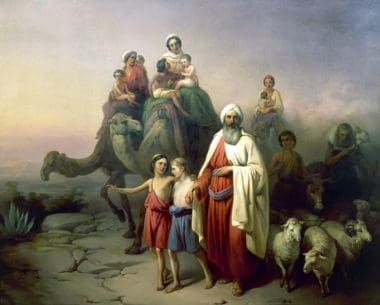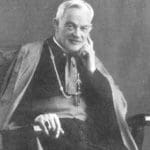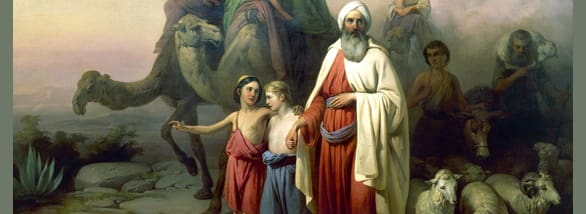“As He spake to our fathers, Abraham and his seed for ever.” Magnificat.
“He hath raised up a horn of salvation for us in the house of His servant David, as He spake by the mouth of His holy prophets, who are from the beginning.” Benedictus.
1. From the beginning was the promise of the Redeemer given; the fall of man was accompanied with the assurance of the “seed of the woman“ that should crush the serpent’s head. More and more is this promise confined to a particular line. Of Abraham it is said that in  his seed should all the nations of the earth be blessed; and the same promise is renewed, in almost the same words, to Isaac, to Jacob, to Joseph, and to Juda, in the last case most explicitly of all: “The sceptre shall not be taken away from Juda, nor a ruler from his thigh, till He come that is to be sent, and He shall be the expectation of nations.” Later Moses, as it were, closes this first cycle of patriarchal prophecies when at the end of his life he assures the chosen people that 1 God would raise up to them a Prophet from among their own brethren like to Himself.” –
his seed should all the nations of the earth be blessed; and the same promise is renewed, in almost the same words, to Isaac, to Jacob, to Joseph, and to Juda, in the last case most explicitly of all: “The sceptre shall not be taken away from Juda, nor a ruler from his thigh, till He come that is to be sent, and He shall be the expectation of nations.” Later Moses, as it were, closes this first cycle of patriarchal prophecies when at the end of his life he assures the chosen people that 1 God would raise up to them a Prophet from among their own brethren like to Himself.” –
2. With the founding of the House of David a new cycle of prophecies began. The Redeemer that is to be is promised to him and his line; and to this the Angel appeals in the Annunciation to Our Lady when he “says: He shall rule in the Kingdom of David.” Then, when the family is settled, come the great prophecies of detail. First is the prophecy of Isaias, which has always been accepted as foretelling the virgin birth of “Jesus. Hear ye therefore, O house of David,” said Isaias to the King, Achaz, who would not listen to his counsel; “is it a small thing for you to be grievous to men, that you are grievous to my God also? Therefore the Lord Himself will give you a sign. Behold a virgin shall conceive and bear a son, and His name shall be called Emmanuel.” Whatever be the literal meaning of the text, the prophecy rung as such in the minds of the Jewish people.
3. Then come the other two great cries of encouragement to His countrymen, lifting them up in the midst of their trouble, each as it were bringing to a focus the many rays of light that had shone through the ages past. The first runs : “For a Child is born to us, and a Son is given to us, and the government is upon His shoulder, and His name shall be called Wonderful, Counselor, God the Mighty, the Father of the world to come, the Prince of Peace; His Empire shall be multiplied, and there shall be no end of peace; He shall sit upon the throne of David and upon His Kingdom to establish it, and strengthen it with judgment and with justice from henceforth and forever.” And the second: “Yet a little while and My indignation shall cease. . . . And there shall come forth a rod out of the root of Jesse, and a flower shall rise up out of his root, and the Spirit of the Lord shall rest upon Him, the spirit of wisdom and understanding, the spirit of counsel and of fortitude, and the spirit of knowledge and of godliness, and He shall be filled with the spirit of the fear of the Lord. He shall not judge according to the sight of the eyes, nor reprove according to the hearing of the ears. But He shall judge the poor with justice, and shall reprove with equity the meek of the earth. And He shall strike the earth with the rod of His mouth, and with the breath of His lips he shall slay the wicked. And justice shall be the girdle of His reins. . . . They shall not hurt, nor shall they kill, in all My holy mountain, for the earth is filled with the knowledge of the Lord as the covering waters of the sea.”
Summary Meditation Points
1. The promise from the beginning.
2. The promise to David.
3. The promise in Isaias.
 Editor’s Note: This meditation is from Archbishop Alban Goodier’s “The Prince of Peace” (1913).
Editor’s Note: This meditation is from Archbishop Alban Goodier’s “The Prince of Peace” (1913).
Art: Abraham’s Journey from Ur to Canaan, Jozsef Molnar, 1850, Restored Traditions, used with permission. Archbishop Alban Goodier, S.J., www.stmaryscadoganstreet.co.uk, all rights reserved, used with permission.




